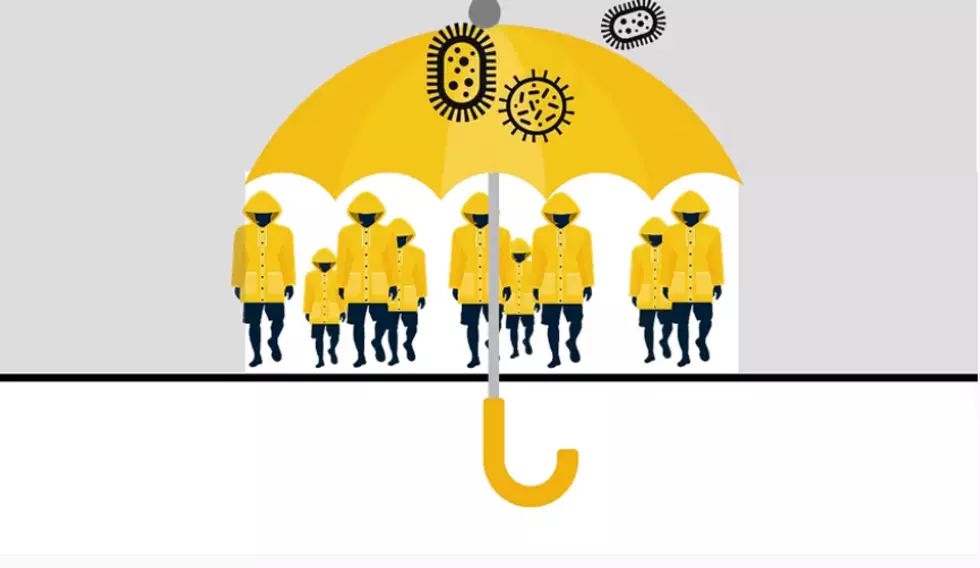
Texas Physicians Explain Herd Immunity Is Needed to Fight Contagious Disease Hotspots
A release from the Texas Medical Association states that a community with enough vaccinated people can protect each other from the spread of contagious disease via Herd Immunity.
How do umbrellas protect us from disease? A Texas physician cites an umbrella analogy to explain that immunizing enough people helps protect us all, thanks to a phenomenon called herd immunity (community immunity).
The protective umbrella of community immunity occurs when a large enough percentage of the population – at least eight in 10 – is vaccinated, becomes immune to infection from diseases, and provides a collective layer of protection for the individuals who are not immune. The higher the vaccination rate, the greater chance to shield infants, the elderly, and those with weakened immune systems from infectious disease outbreaks.
For example, a highly contagious illness like measles requires a vaccination rate of 90 to 95 percent for community immunity to work. Polio, which is less contagious, requires a vaccination rate of about 80 to 85 percent. If enough people in a community have their shots, even those who refuse to get vaccinated are protected by the immunized, said Austin pediatrician Ari Brown, MD. However, if too many people refuse to vaccinate, community immunity falls apart.
"When you get vaccinated you are getting excellent protection," said Dr. Brown, "but you actually get even better protection when most people in your community are also vaccinated because it makes it even harder for outbreaks to occur."
Maintaining community immunity is a challenge because Texas is one of 18 states that allow parents to refuse mandatory school vaccinations for their children for reasons of conscience. Dr. Brown says too many parental refusals within a community can create vaccine-free “hotspots” that in turn could lead to disease outbreaks. “A lot of families who opt not to vaccinate their kids choose the same preschool or the same private school to send their kids, and then their vaccination rate is even lower than the general community,” Dr. Brown said. That low rate creates a zone of vulnerability for everyone in that school or area.
Texas has several hotspots – including Collin, Harris, Tarrant, and Travis counties – areas that are likely to see measles outbreaks in coming years, reports the Texas Medical Association’s (TMA’s) Texas Medicine magazine. During the 2018-19 school year, 69 accredited kindergarten through 12th-grade Texas private schools had exemption rates at 10% or higher, high enough to weaken community immunity against measles, according to the Texas Department of State Health Services.
Dr. Brown said patient participation is the key to sustaining community immunity.
“Think of germs like the rain,” she explained in a TMA video. “When you get vaccinated, you are actually putting on a raincoat to protect you [from disease-causing antigens]. It’s better, though, to have an umbrella AND a raincoat to protect you. The only way you have an umbrella, though, is if the whole community shares in buying the umbrella [most everyone must get their shots]. By protecting your community with the umbrella, you are also protecting people who can’t get vaccinated and can’t wear that raincoat,” said Dr. Brown. “When 90 to 95% of your community is protected it keeps outbreaks from happening.”
She added, “We know this because we’ve seen it happen,” referring to disease outbreaks that have occurred in areas with low vaccination rates.
Get vaccinated, she suggests, to protect yourself, your loved ones, and your community.
For more than a year TMA highlighted contagious diseases that childhood and adult vaccinations can prevent, including measles, chickenpox and shingles, pertussis (whooping cough), and many others. TMA also has explained how vaccines protect people, and addressed the autism myth. TMA seeks to raise immunization awareness and fight back against false claims that hamper immunizations.
TMA is the largest state medical society in the nation, representing more than 53,000 physician and medical student members. It is located in Austin and has 110 component county medical societies around the state. TMA’s key objective since 1853 is to improve the health of all Texans.
Be Wise – Immunize℠ is a joint initiative led by TMA and the TMA Alliance, a volunteer organization of physicians and their spouses. BWI is funded in 2020 by TMA Foundation thanks to major support from H-E-B and generous donations from physicians and their families and other donors whose gifts create a Healthy Now and Healthy Future for more Texans.
Be Wise – Immunize is a service mark of the Texas Medical Association.

